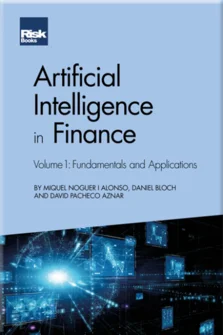Artificial intelligence
Miquel Noguer i Alonso, Daniel Bloch and David Pacheco Aznar
Artificial intelligence
2.1 DEFINITIONS OF INTELLIGENCE
Intelligence is a multifaceted construct that encompasses the ability to learn from experience, adapt to new situations, understand and handle abstract concepts and use knowledge to manipulate one’s environment. The study of human intelligence is a broad field, drawing from various disciplines such as psychology, neuroscience and AI. We list below some key references that offer insight into the concept of intelligence.
-
Spearman (1904) introduces the concept of general intelligence (g), a single underlying factor that contributes to performance across various cognitive tasks.
-
The research by Cattell (1963) delineates fluid intelligence (Gf) and crystallised intelligence (Gc), with the former referring to the ability to solve novel problems and the latter involving the application of accumulated knowledge and skills.
-
Gardner’s theory of multiple intelligences (Gardner 1983) proposes that intelligence is not a single construct, but consists of multiple, independent types of intelligence, such as linguistic, logical-mathematical, spatial, musical and interpersonal intelligences.
-
The triarchic theory of intelligence by Sternberg (1985) posits three aspects
Copyright Infopro Digital Limited. All rights reserved.
As outlined in our terms and conditions, https://www.infopro-digital.com/terms-and-conditions/subscriptions/ (point 2.4), printing is limited to a single copy.
If you would like to purchase additional rights please email info@risk.net
Copyright Infopro Digital Limited. All rights reserved.
You may share this content using our article tools. As outlined in our terms and conditions, https://www.infopro-digital.com/terms-and-conditions/subscriptions/ (clause 2.4), an Authorised User may only make one copy of the materials for their own personal use. You must also comply with the restrictions in clause 2.5.
If you would like to purchase additional rights please email info@risk.net











